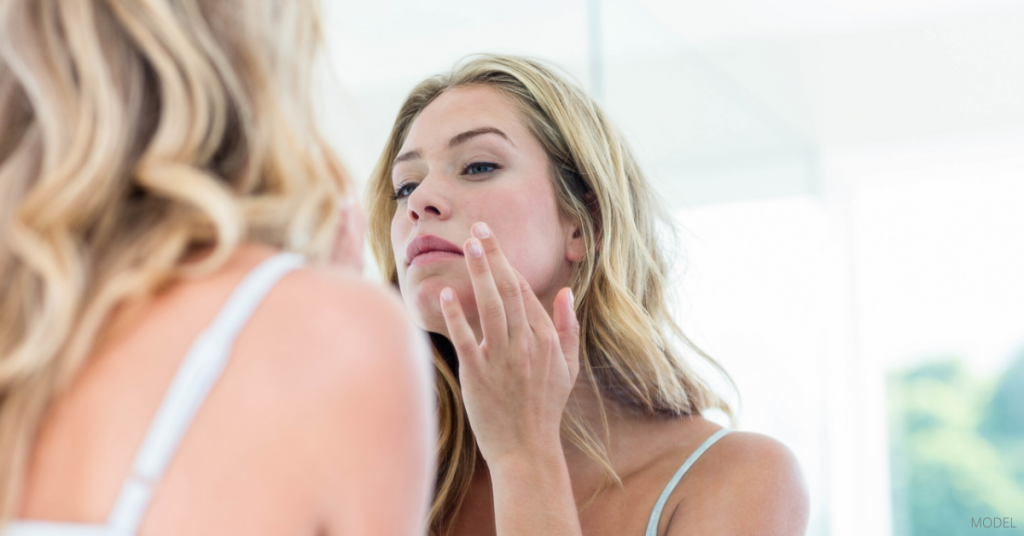Between the ages of 20 and 25, the body inevitably starts to produce 1% less collagen in the dermis each year. The integumentary system (the skin) is the largest organ in the human body. While we cannot stop the natural aging process, as a plastic surgeon in Albany, NY, I know that we can slow it down and make sure the skin is functioning and looking its best.
Healthy Skin Function
The three main layers in the skin are the epidermis, dermis, and subcutaneous (fat layer).
- The epidermis is the outermost layer, and there you can find oil, sweat glands, hair follicles, and pores. It is the main barrier for protection.
- The dermis is where collagen and elastin are made, and it contains blood vessels and provides temperature regulation. The dermis and epidermis work simultaneously.
Within each layer, there is a specific function or job. The dermis is where collagen and elastin are produced and found. New cells are created here, and messenger proteins, extracellular matrix (wound healing), and enzymes turn over to the epidermis for cell life and proper skin function.
To learn how to keep skin healthy, check out our related blog post.
What Happens When Skin Ages?
As the skin ages, the barrier function can become compromised, leaving it susceptible to skin conditions or concerns. The skin’s cell turnover rate in healthy skin should be every 30 days. Cell turnover slows significantly with age, and transepidermal water loss (TEWL) can take effect due to the decrease in natural moisture factors (our bodies’ natural hyaluronic acid replenishment).
Dermal regeneration where collagen and elastin are made and stored is impaired due to matrix, cellular, and vascular aging changes. The connections between epidermis and dermis weaken as the dermis thins, and fibroblast response lessens (think of loss in elasticity and wound healing). When the skin barrier function is compromised, hydration and fatty acid replenishment reduction lead to dry, dull, and thinning skin.
What Makes Skin Age Faster?
There are several key intrinsic and extrinsic factors in accelerated skin aging:
- Sun exposure: UV rays cause cell death (apoptosis), UVA (aging), and UVB (burning)
- Pollution/free radicals: Higher polluted areas result in a higher risk of premature aging
- Smoking: Dull skin, breakdown in collagen, smokers’ lines, almost a greyish look
- Lifestyle: Alcohol, drugs, lack of sleep, working conditions, etc
- Medical conditions: Cancer, medications, and chemo/radiation can take a toll on the skin
- Genetics: Predisposed intrinsic factor one cannot change
Scientifically Proven Ingredients to Help Delay Aging
In our opinion, medical-grade skincare products are best! Look for products that include some of the following ingredients:
Antioxidants: Like taking your vitamins for the skin. Without vitamin C and antioxidants, collagen cannot be produced in the cells. Vitamins also help with discoloration and protect against free radicals and pollution, which are known to cause premature aging.
Retinoids/retinol/tretinoin vitamin A derivatives: Activate cell turnover, help with the overall tone and texture, and they’re great for lines and wrinkles as well as pores and breakouts. Everyone should be on this in moderation, depending on skin type/concern.
Hyaluronic acid: Replenish natural moisture factors for hydration and plumping.
Sunscreen 30+ daily: Protects against premature aging and potential skin cancer risks. Without daily SPF use, anti-aging products are a waste and can cause unwanted irritation and/or poor results.
Aging is a complex process, and no one thing can attribute to that. However, being proactive and taking preventative measures can truly make a difference in overall skin health for the desired look.
Prevent, stimulate, and maintain are the three key ideas. Stability in the skin’s health and cell function in the dermis and epidermis depend on consistency and proper maintenance. Stick to medical-grade, clinically proven ingredients that will deliver results.
And when routine skin care at home falls short, we offer a variety of skincare treatments to help rejuvenate and refresh your skin. If you’re ready to learn more about skin rejuvenation, request a consultation online or call us at (518) 328-3330.


Leave a Reply